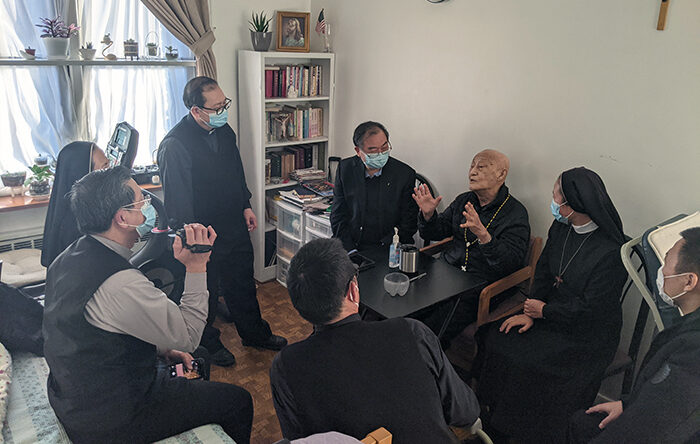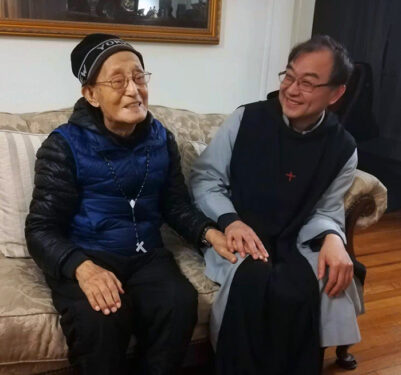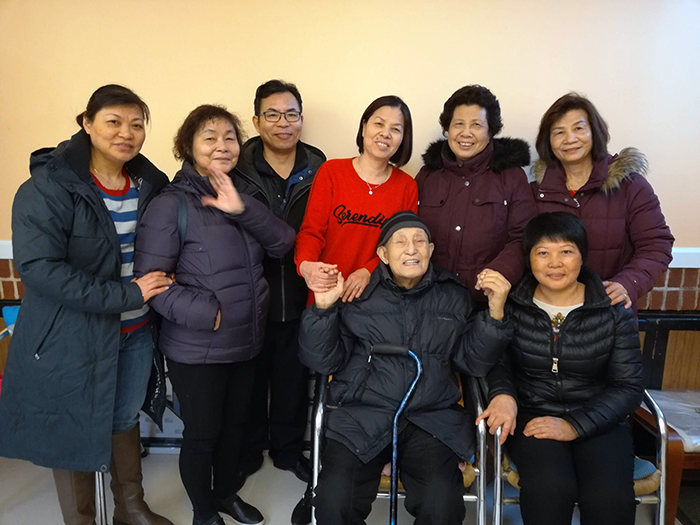
PROSPECT HEIGHTS — As Dehua (Edward) Zhang toiled three decades in forced labor camps throughout China, the guards noticed something different about him.
No one understood why the prisoner was never angry, or why he never complained, cursed, or brawled with other detainees.
The explanation was rooted in the reason for his arrest in 1958. Zhang, born 34 years earlier to a devout Catholic family, had sought the priesthood, which brought him a 30-year sentence of hard labor meted out by brutal Communist authorities.
“He was spiritually different,” explained his longtime friend, Brother Peter Li of Elmhurst, Queens. “In a labor camp, people fight with each other. There is screaming, yelling, but he was going to be a priest. So he wasn’t doing that. He had a different attitude, a different way to see prison life.
“He would say other people blame this, blame that, but he did not. He believed, ‘I’m here because of my faith, and I blame nobody because of my faith.’”
Father Zhang was 72 years old in 1996 when he finally took his perpetual vows at St. Paul’s Catholic Church in Elmhurst. During the next 24 years, “Father Ed” accomplished a storied ministry to people of Chinese heritages in all five boroughs and beyond.
He was 98 when he died Feb. 3 after a brief illness. His funeral Mass was offered Feb. 11 by Bishop Robert Brennan, who never knew Father Zhang, but said he wished he had, and made sure to share the priest’s signature quote.
In his homily, Bishop Brennan said the priest “is known to have said, ‘All this is the Divine Will of God, the best arrangement of God. God is love, so I hate no one.’ ”
Brother Li, also from China, came to the U.S. in 1991 and settled in Queens. He is the provincial superior of the North American order of the Congregation of St. John the Baptist, connected to St. John Vianney Parish in Flushing. He said Father Zhang arrived in Queens in 1994 after fleeing China. Once he began his pastoral ministry, the priest worked hard to make up for the time lost to imprisonment.
Dehua Zhang’s story began when he was born Oct. 24, 1924 in Tianjin, Hebei Province, China, about 80 miles southeast of Beijing. The family had five children. Dehua dreamed of, and pursued, the priesthood; his two sisters became nuns.
He joined the Little Brothers of St. John the Baptist on Nov. 18, 1944, and he made his first vows on Aug. 28, 1947, in Qinghe Town, in Beijing Province, China. But his priestly quest was an affront to government officials, who sentenced him to hard labor.
Brother Li said he didn’t know which camps where Father Zhang was held, only that he toiled all over China, from the northern border with Mongolia, to a spot near North Vietnam in the southwest.
The harsh living conditions and the cruelty of the guards and administrators in the camps are infamous to citizens and immigrants from China, Brother Li said. But, while Father Zhang didn’t dwell on the violence, he did share some stories of what he endured.
For example, Father Zhang told of being ordered to help recover bodies from the 1970 earthquake that struck Tonghai, about 300 miles northwest of the North Vietnamese capital of Hanoi, killing an estimated 15,000 people.

The priest recalled that, hours before the quake, two officials had arrived at the camp and ordered him to guard their car while they slept in a nearby building. After the quake hit, the building toppled, killing the officials. If Father Zhang hadn’t been made to stay outside with the car, he too might have died, Brother Li said.
Father Zhang was released early on parole, and immediately was ordained as a priest on Dec. 19, 1986. But authorities found out about his ordination and pounced again, punishing him with another eight years in prison. He steadfastly practiced his faith throughout the persecution, habitually waiting until nightfall to say the rosary, counting the prayers on his fingers under the cover of his blankets.
On April 16, 1994, Father Zhang fled to Hong Kong and arrived in New York a month later. He took his perpetual vows in 1996, and ultimately became parochial vicar for Our Lady of China Chapel in Elmhurst and St. John Vianney Parish in Flushing.
His far-flung ministry took him to nursing homes and hospitals across New York City, Long Island and New Jersey — and at times as far as Connecticut and Pennsylvania. Many people with whom he shared the Gospel and sacraments were elderly and spoke only Mandarin or Cantonese dialects.
Wei Chan, who immigrated to Queens from China and became a parishioner at St. John Vianney, developed a special bond with Father Zhang. She speaks very little English, but, with her son Stephen translating for her, she said the priest became a spiritual mentor for her, and she in turn became one of several parishioners who helped him work through his busy ministry schedule.
That ministry included regular visits to elderly Chinese Catholics at the Anna Erika Assisted Living Home and the Care Center for Rehabilitation, both on Staten Island.
Wei Chan said on one such visit, Father Zhang asked her to help bring residents in their wheelchairs to the dining area. She recalls that when she referred to them as elderly people, the priest corrected her, saying: “‘This is not an elderly person, this is Jesus.’”
An aging Father Zhang began to slow down in 2015, and he suspended his trips to Staten Island. But he still visited nursing homes and hospitals in Queens until the start of the COVID pandemic in the spring of 2020.
The Chan family had moved Father Zhang from the St. John Vianney rectory to their home nearby, in an effort to shield him from the coronavirus. But by late January, he had difficulty getting out of bed. He went to the hospital, but soon had difficulty breathing. He passed away Feb. 3. His funeral Mass on Feb. 11 filled the inside of St. John Vianney, Brother Li said.
“I had 280 prayer cards made,” he said. “They’re all gone.”
Bishop Brennan was so moved by Father Zhang’s story, he shared it the day after the funeral at the Mass he celebrated to dedicate a new stained-glass window at Our Lady of the Miraculous Medal in Ridgewood, Queens.
He remarked that Father Zhang exemplified the Beatitudes as described in Luke 6:17, 20-26, in which Jesus promises joyous blessings following terrible woes.
“You would think he had every right to be bitter, to pity himself and expect everyone to pity him,” Bishop Brennan said of the priest. “He knew poverty and hunger and thirst. He knew weeping, exclusion, insult and denunciation. He knew all the things that Jesus listed when he gave the Beatitudes.
“But he also knew the other side of the Beatitudes. That those who shed tears would one day be rejoicing.”

